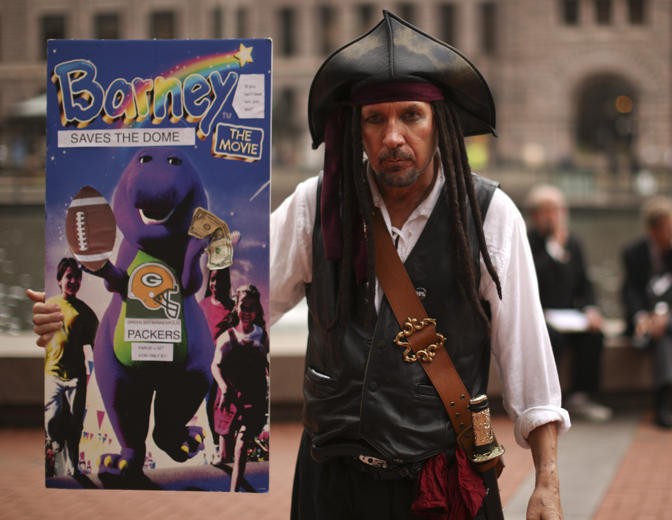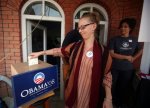MINNEAPOLIS (AP) — The next mayor of Minneapolis might be one of two City Council members. It could be one of two former City Council presidents, or a former county commissioner. Or maybe it will be Captain Jack Sparrow. Or the hairy dude who comes striding out of a lake in an online campaign video, points at the camera and promises to stop visiting strip clubs if he’s elected.
Videos by Rare
It’s a weird and wide-open race for mayor this year in Minnesota’s largest city.
With no incumbent on the ballot, an exceptionally low candidate filing fee of $20, and the city’s continuing experiment with a novel voting system, the November general election has a whopping 35 contenders on the ballot.
“It’s like mayor soup,” said Katherine Milton, a Minneapolis voter and arts consultant who is one of many trying to figure out the city’s “ranked choice” voting system. “It’s like putting together a 5,000-piece puzzle.”
The cluttered contest comes at an important moment for this city of 393,000, as its population has begun to shoot up after decades of decline. Popular outgoing Mayor R.T. Rybak made himself a high-profile booster-in-chief by luring young professionals and empty nesters with the city’s dozens of parks and lakes, many miles of bike trails, thriving restaurant and nightlife scene, diverse cultural amenities, pro sports venues and legal gay marriage.
After 12 years, Rybak, 57, is calling it quits. That means the first serious test for ranked choice voting, which asks voters to pick a first, second and third choice for the job. Those selections come into play if no candidate gets more 50 percent of the first-choice votes, triggering a series of automatic runoff counts.
That’s put the candidates in an unusual position.
“It’s an unnatural act for a politician to ask to be somebody’s second choice,” said Mark Andrew, a Democratic former county commissioner who’s among a handful of front-runners. “But if people tell me they are supporting someone else, then I ask to be their second choice.”
That dynamic has even led to political opponents — gasp — saying nice things about each other. Betsy Hodges, a Democratic city councilwoman and another leading candidate, has had kind words for Don Samuels, a fellow councilman, and Cam Winton, a Prius-driving, gay-marriage supporting moderate Republican who hopes that ranked choice is his opening in this heavily Democratic city.
Hodges and Andrew both said they frequently encounter voters who complain of not understanding the system, which was instituted in 2006 as a progressive reform that eliminates costly, low-turnout primaries and gives voters a wider selection of candidates.
The race features eight relatively conventional contenders who boast a wide range of experience in local politics. After that, things get freewheeling.
“I’m just a regular guy who is trying to wake people up,” said Jeff Wagner, an airport baggage handler whose offbeat swimsuit video went viral.
Then there’s the frequent but always unsuccessful candidate who will appear on the ballot as Bob “Again” Carney. And the aforementioned Captain Jack Sparrow, a self-proclaimed “occupirate” who espouses Occupy Wall Street ideology. Sparrow — it’s his legal name — initially showed up at campaign events in full pirate drag, but he’s lately taken to wearing business suits to be taken more seriously.
“Twenty bucks down and you too could be the mayor,” said Casey Carl, the Minneapolis city clerk, who’s proposing an increase to the lowball fee. Neighboring St. Paul, which also has ranked choice voting, has a $500 fee, and just four candidates for mayor this year.
A handful of other U.S. cities including San Francisco and Oakland, Calif., also employ ranked choice voting. It has had little impact in Minneapolis elections before this year, with Rybak’s popularity making the also-rans moot.
Whoever comes out on top Nov. 5 will be faced with keeping up economic growth and managing property tax rates while addressing the problems of the public school system and the struggling north side, where the heaviest concentration of non-white residents live.
“I’m a little confused by it,” said voter Carl Goldstein, a nonprofit executive who says he’s trying to sort out the names and choices. “I think in theory it’s a good method, but I don’t know. I think we have to try it a few times and see if we like the results.”



